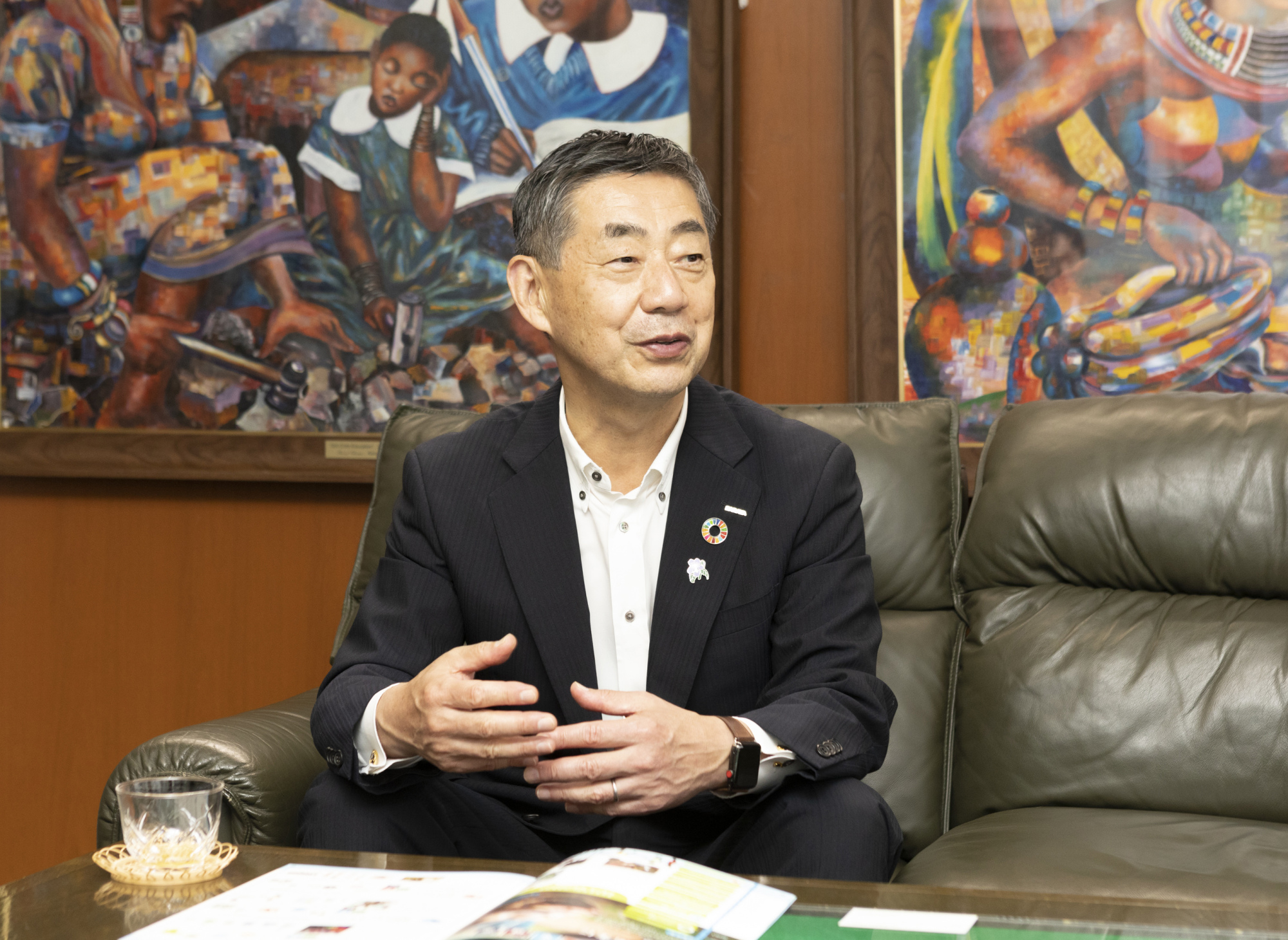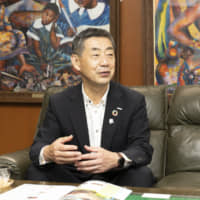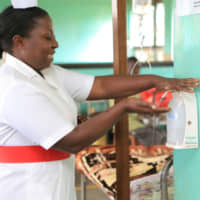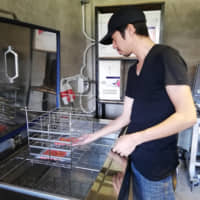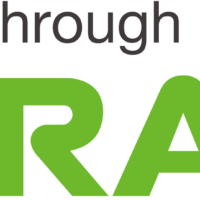From Aug. 28 to 30, The Seventh Tokyo International Conference on African Development (TICAD 7) will be held in Yokohama. Saraya Co. hopes that this meeting will serve as a milestone for the harmonization of African nations.
Those who live in Japan long enough to know some brands of long-selling consumer goods may think of a dishwashing detergent in a bottle with a palm tree design when they hear the company name "Saraya." However, the products Saraya manufactures actually cover a variety of categories from detergent, hair care and cosmetics to sweetener and the cold chain system. They also specialize in services supporting health and hygiene such as conducting food inspections, providing information and seminars on health, food sanitation or medical topics, and reprocessing medical devices.
Using diverse technologies, knowledge and its products, Saraya takes proactive approaches to health, social and environmental issues.
On the health and social front, the company is effectively using its products to support and promote hygiene in Uganda and other African nations.
"Access to clean water has been a challenge in Uganda. In some places in northern Uganda, refugees, mainly from South Sudan, live in a densely populated condition where hygiene is of utmost importance to prevent epidemics," said Yusuke Saraya, president of Saraya.
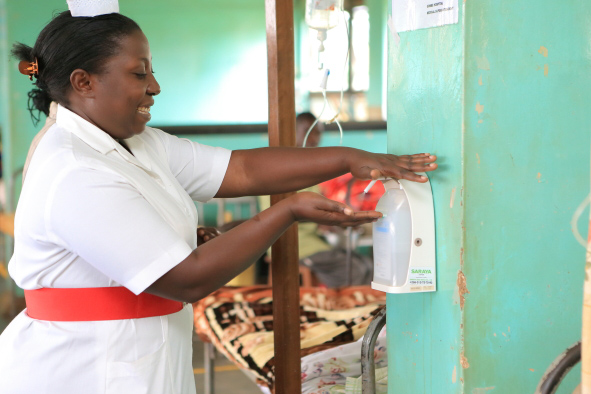
Projects for the community
The first initiative the company launched in Uganda was "Wash a Million Hands!" project in 2010 to promote hand-washing and the use of soap and tippy tap (domestically produced hands-free foot pedal dispenser). "The year 2012 was Saraya's 60th anniversary, and we wanted to plan some kind of a commemorative project. So we consulted UNICEF to find out if there was anything we could do in any part of the world using our specialty," said Saraya.
"We learned the critical situation in Uganda where the death rate of children under the age of 5 was high. The main cause was diarrhea stemming from diseases such as cholera," he said.
Hand-washing with soap is the most basic way of prevention for such diseases. "The Ugandan government was also eager to promote hand-washing in the country, so we collaborated with the government and UNICEF to launch this project," he said. In 2011, Saraya East Africa was established to incorporate a business approach to the project to make the project sustainable.
"What is important as a business is to continue such projects that help the community sustainably. We are creating local businesses with the local people, processing the local resources with advanced technologies and putting products in the local sales channels," said Saraya.
Saraya further commented that the hand-washing project in Uganda was initially a three-year project, but by setting up local businesses to support it, the project period has extended to 2021. "And it is starting to cover a greater area with our new entity set up in Kenya," said Saraya.
In 2012, Saraya extended its efforts to promote hygiene to hospitals through the "Preparatory Survey for BoP (base of the pyramid) Business Promotion" system of the Japan International Cooperation Agency (JICA). The system is designed to promote and support companies entering the countries referred to as the base of the pyramid to start businesses there.
"The hospital project focused on hand sanitization using rubbing alcohol, but imported disinfectants are expensive, so we started the local production of an alcohol hand rub in 2014," said Saraya.
This is how the "Saraya Safe Motherhood Project" was launched in 2018. "At some clinics, which we had a chance to visit through the project supported by RHU (the NGO Reproductive Health Uganda), we saw many pregnant women waiting to be treated or on the way to the delivery," he said. "What worried us was the unhygienic environment and tools, which can pose a substantial risk for both mothers and babies. To improve the conditions surrounding childbirth, we have been conducting hand-washing education projects and promoting an alcoholic disinfectant at maternity centers in addition to hospitals."
Addressing sustainability
With the upcoming TICAD 7, Saraya hopes things can move forward and faster if all African countries collaborate on common policies and standards, which will also make it easier for companies like Saraya to enter the African market.
"It takes more than one year to acquire a necessary license to sell a chemical product in an African country, but there are other fields such as food processing that can be profitable in a shorter time frame," he said.
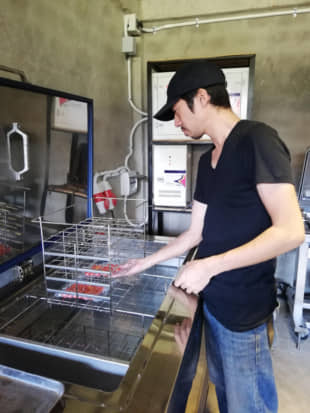
Using the Rapid Freezer unit and packaging devices Saraya has developed, they have also been contributing to building a cold chain to deliver fresh fish from the coastal city of Mombasa in Kenya to Kampala, the capital of Uganda.
Saraya has eight plants and 26 sales bases outside Japan. "We are planning to network them to attain higher efficiency in product distribution. We have just established a subsidiary of our Egyptian local entity in Dubai, which will serve as a hub to distribute our products to Middle Eastern countries," said Saraya.
Some of their current and future projects include the development of medication for jigger bites, production of essential oils from local flowers in Tunisia, and planting jojoba trees and extracting jojoba oil in Egypt. Saraya intends to boost the local labor market through these new businesses.
To address climate change and preserve biodiversity, Saraya donates 1 percent of the sales from some of their products including its signature Yashinomi detergent to the Borneo Conservation Trust in Malaysia. The organization carries out such projects as creating the Green Corridor to connect the riverside forests and inland tropical forests to preserve the natural habitats by purchasing lands, and rescuing injured or isolated animals.
Saraya has also been using palm oil certified by the Roundtable on Sustainable Palm Oil for its products. The palm oil is made in a sustainable way with consideration for human rights and environment. Saraya also partners with a company that generates biomass energy from coconut oil mill waste.
"We all have the responsibility to hand down what we have to the next generations. The whole idea of the Sustainable Development Goals set by the United Nations General Assembly in 2015 is to pursue the balance among society, economy and environment," said Saraya. "It is ideal if each private enterprise tries to understand the idea and take actions to leave no one behind in the society."




